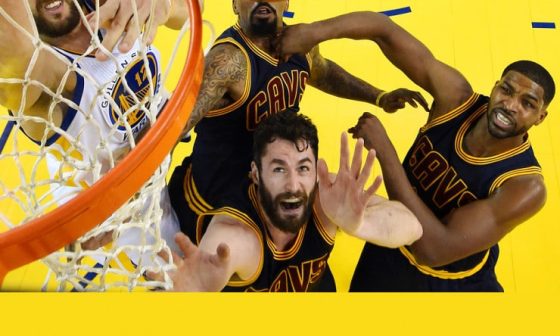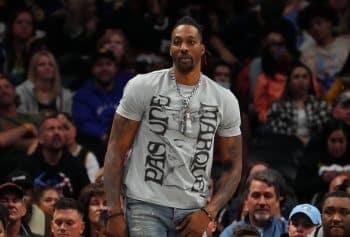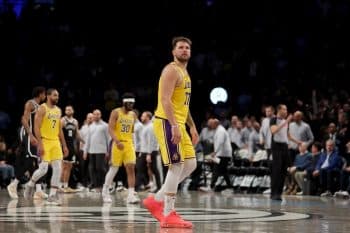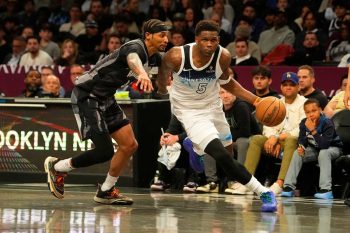NBA
Thompson, Love and Value in the Eye of the Beholder

The intersection of sports and business is illuminated in its most fascinating light through player contracts. In virtually no other industry are so many details of an individual’s workplace compensation so public, nor so vital from a competitive standpoint: Some Fortune 500 company overpaying an executive is merely an overage, but one truly egregious NBA contract can doom a billion-dollar franchise for years. Talent and success beget rewards and promotions in all fields, but nowhere else is this reality so multi-faceted and potentially explosive.
Conversations related to individual player value, even among ostensibly informed folks, often reveal how hard it can be to separate these additional variables from our typical assessments. Just take the case of Cleveland Cavaliers big men Kevin Love and Tristan Thompson.
By all of our most commonly used tools for evaluating players, Love is a more valuable NBA player than Thompson – almost certainly by a wider gap than the $31 million difference (over five years) in their contracts signed last offseason would indicate. Love has been in the league longer but remains in his physical prime, and has been on another value-tier altogether from Thompson for the vast majority of his eight years in the league. He’s made three All-Star teams and two All-NBA teams; Thompson made the All-NBA Rookie Second Team.
Most evidence during the season would point in the same direction. Love played more minutes than Thompson (despite missing five more games), collecting more of every valuable counting statistic and proving significantly more efficient from a box score standpoint. He finished 10th in the NBA in ESPN’s Real Plus-Minus metric, which is designed to parse out individual impact independent of factors like teammate and opponent quality on both ends of the floor, while Thompson was unable to crack the top 100.
To one degree or another, most of these trends remained intact through the Eastern Conference playoffs. Love lit it up from deep (he remains one of three Cavs in the league’s all-time top 20 for playoff three-point accuracy as of this writing), and was second behind only LeBron James on the team in plus-minus despite playing the fourth-most minutes to that point. Thompson’s own production actually dipped from his regular season totals, though it didn’t matter much as the Cavs rolled through the East.
One might say things have gone a bit differently in the Finals.
Even putting aside Love’s one-game absence due to a concussion, the total reversal in impact has been staggering. Thompson is playing nearly eight more minutes a night against the Golden State Warriors, shooting 61 percent to Love’s 37 percent and making his more handsomely compensated teammate (and everyone else on the court besides LeBron James, really) look like a JV player on the glass. Tristan’s plus-38 while on the court easily leads the Cavaliers in a series where the two teams have scored an identical number of points; Love is one of just two rotation pieces still in the negative.
Thompson’s rebounding has been Dennis-Rodman-like against this Dubs team. SportVU data defines an offensive rebounding “chance” as any occasion where a player is within 3.5 feet of an available offensive board – Tristan and Andre Drummond naturally led the league by a wide margin in per game opportunities here for the regular season, both at slightly over eight per night.
For the series, though? Thompson is up well over 11 offensive rebounding chances per game. He’s collecting them at an identical rate – about 40 percent, actually a tad below league average – which is a sign that the Warriors are doing a solid job fighting him for the ball once it’s in the air, but he’s so relentless in his positioning and pursuit that he’s hurting them anyway. Let a guy with his energy level get near a loose ball enough times, and the results start favoring him.
Has Tristan Thompson suddenly become more valuable than Kevin Love as an NBA player? Of course not!
For starters, the shocking turnaround really isn’t all that shocking to the careful eye. Love’s issues against this Warriors team are obvious conceptually and even clearer in practice. He’s a visible defensive liability against a Dubs squad that subsists by devouring those uneven matchups; total ineffectiveness in the post even against smaller switches (he’s just not quick enough of mind or body to navigate their buzzing help schemes) has left him most frequently operating as a defensively challenged spot-up shooter.
Thompson, meanwhile, fits this series like a glove. He can hold up in any defensive match-up for 24 or fewer seconds at a time, a shadow sticking even to the likes of Steph Curry and Klay Thompson both on and off the ball and allowing Cleveland to mimic Golden State’s switching scheme. He’s the ideal center for LeBron and Kyrie Irving, a roll man who sucks in help defenders with his gravity and can finish difficult lobs.
He’s the best rebounder on either team by a wide margin, a fact amplified by the knowledge that it’s one of a very small handful of things he’s asked to do. Thompson is wearing this Dubs team down with relentless energy, a growing factor with Andrew Bogut sidelined for the series.
All this touches on one of the major areas where the NBA and other pro sports leagues distinguish themselves as businesses: The concept of relative value.
The line of thinking is easy enough to follow, and the Love/Thompson situation illustrates it perfectly. In a vacuum and against at least 25 NBA teams, Kevin Love is worth more on the court than Tristan Thompson. But the NBA isn’t played in a vacuum, and the Cavs have operated in a highly contextualized situation since King James rode back into town. They aren’t concerned solely with those 25 teams, and in fact are much more focused on the other handful – primarily the historically great behemoth who beat them in the Finals a year ago.
Through the right theoretical lens, Thompson would be worth his $83 million deal if these six games were the first basketball he’d played all year. This team wasn’t being slowed in the Eastern Conference even if he took a vacation for that first month. Cleveland’s cap situation made replacing him impossible if they let him walk in restricted free agency last summer, and long playoff runs plus Dan Gilbert’s deep pockets mean the tax bill Tristan helped add to isn’t really a concern. Don’t think for a moment that Thompson’s specific role in a hypothetical Finals rematch wasn’t a primary negotiating point last summer.
The theme has relevance well beyond this team and this series, particularly headed into a summer of contract insanity. A guy’s value to a specific franchise could be wildly different than to many others. Players who are nowhere near worth the traditional “max contract” designation will get it anyway, and many will be “worth it” relative to that team’s goals. Some front offices will still surely make rash moves, but the method for determining these will go well beyond the dollar figures they hand out.
So were Kevin Love and Tristan Thompson worth their respective contracts? It’s all in the eye of the beholder, and in no other profession does this theme ring more true.











